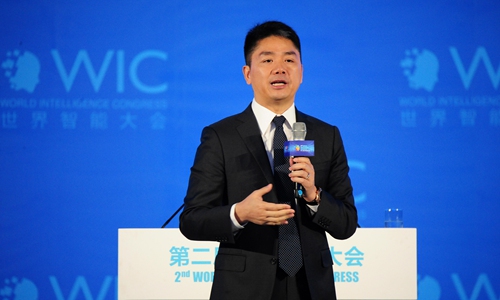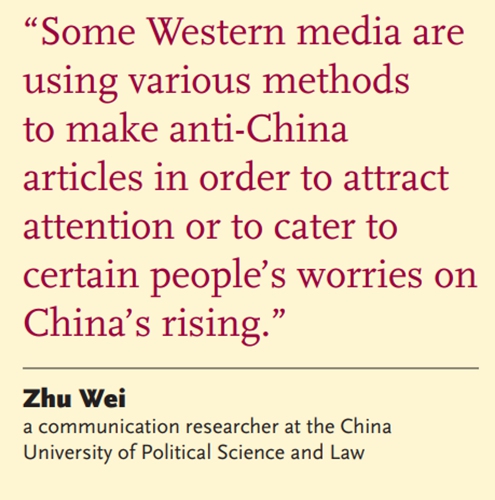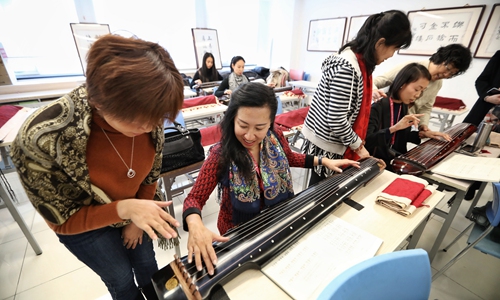HOME >> CHINA
NYT report disregards China’s women’s rights protection: experts
By Liu Xin and Li Qiao Source:Global Times Published: 2019/12/17 14:13:40

Liu Qiangdong, founder of JD.com, one of China's leading e-commerce platforms. Photo: cnsphoto
○ Chinese experts criticized latest New York Times report on Liu Qiangdong's rape allegation as full of bias and reflective of how certain US media outlets lack professional ethics and are unable to set aside prejudices when reporting on China○ Protection of women's rights in China has improved in recent years with enhanced public awareness and more comprehensive legal protection, a Chinese lawyer said
The rape allegation of Chinese billionaire Liu Qiangdong was back under spotlight recently after The New York Times (NYT) published an interview with the accuser, Liu Jingyao. The newspaper used the case to claim that "sexual harassment and assault are widespread in China and elites face little scrutiny."
Experts said that despite Liu Qiangdong's story, the NYT reporter wrongly depicted Chinese society as one that is indifferent to women's rights, without morals, and uncivilized. The one-sided report, full of bias, reflects how certain US media outlets lack professional ethics and are unable to set aside prejudices when reporting on China.
The report, released Friday, interviewed Liu Jingyao, a 21-year-old college student at the University of Minnesota, who alleged that Liu Qiangdong, founder of one of China's largest companies, JD.com, followed her back to her apartment and raped her on August 31, 2018.
The report included details of Liu Jingyao's life after the allegations were made public and said she had been "slut-shamed" online by 800 million people in China.
Despite the fact that the truth of Liu Qiangdong's case remains unclear to the public, the NYT reporter failed to see Chinese society's criticism toward Liu Qiangdong during the past year. The reporter included her prejudice in Liu Jingyao's story, for example, accusing China of having 800 million internet users without access to independent news, Chinese netizens said.
Chinese netizens also questioned whether the NYT reporter wanted to write about Liu Jingyao's story or make her another "spokesperson" for the newspaper to defame China.
Collapse of a tech billionaire
The NYT story claimed that "sexual harassment and assault are widespread in China, and elites face little scrutiny."
Zhu Wei, a communication researcher at the China University of Political Science and Law, told the Global Times that the reporter's words were sinister attempts to smear China and were filled with bias.
"It is fake news that elites face little scrutiny for sexual harassment and assault in China. Liu Qiangdong's company suffered severe loss of market value for this case. China is never a nation which indulges the rich or disregards women's rights," Zhu said.
Although US prosecutors recently announced that Liu Qiangdong would face no criminal charges because the case had "profound evidentiary problems" and it was unlikely they could prove his guilt beyond reasonable doubt, according to the South China Morning Post, Liu Qiangdong has also received criticism from Chinese netizens.

Global Times
In contrast to his frequent appearances on public occasions and his name noted in various news reports, Liu Qiangdong has kept a low profile since news of the scandal surfaced. The last post on his Sina Weibo account was made on December 22, 2018 where he apologized for the harm that his wife and family had endured.Liu Qiangdong said in the post that he had not been charged by US prosecutors, which proved that he did not break any law. "But what I did has brought great harm to my family, especially my wife, to which I was full of remorse and regret," Liu Qiangdong said on Weibo.
Some netizens said that Liu Qiangdong stained his moral record, which also had a bad influence on his company.
The company's shares experienced their harshest drop in the US following news of Liu Qiangdong's arrest in August 2018. The company's American depositary receipts (ADRs) tumbled 10.6 percent in Nasdaq trading to $26.30 in December 2018, the steepest fall since its IPO on May 21, 2014, according to the South China Morning Post.
In March 2019, Liu Qiangdong resigned for "personal reasons" as a member of the 13th National Committee of the Chinese People's Political Consultative Conference (CPPCC). According to CPPCC regulations, members who have acted against social morals may be asked to resign.
According to tianyancha.com, a company profile website, Liu Qiangdong was relieved from his responsibilities with 15 companies affiliated with JD.com since November.
Zhu explained that the single-perspective NYT report reflected the bias and unprofessional ethics of US media, and added that the case is still under investigation.
Responsible media should respect the laws and facts, instead of using Liu Jingyao to criticize China and opening her wounds to attract public attention.
"Some Western media are using various methods to make anti-China articles in order to attract attention or to cater to certain people's worries on China's rising," Zhu said.
When considering sexual scandals in the US that involved former US President Bill Clinton, Hollywood mogul Harvey Weinstein, and NBC's Matt Lauer, does US media feel embarrassed when smearing China with only a single case, Zhu asked.
Lower tolerance for morality stains
"In fact, public opinion in China has a lower tolerance for extramarital affairs and a higher requirement for private morality, especially for celebrities," Zhu said.
For example, billionaire and China's "godfather of English training" Yu Minhong, CEO of New Oriental Education and Technology, apologized in November 2018 when he said, "Chinese women are responsible for China's decline" during a Power of Learning conference, an annual forum that focuses on education, in Shanghai.
Yu later issued an apology on Weibo where he said that he didn't express his opinion clearly and was misunderstood. "What I really meant was that women's level can represent that of a country. Well-educated women could cultivate well-mannered children. Women's values could also influence those of men."
However, not all netizens accepted Yu's explanation. And many netizens called on Yu and other so-called successful men to respect gender equality.
Lü Xiaoquan, a Beijing-based lawyer, told the Global Times that many opinions in the NYT story are groundless and lack professional ethics.
He wondered how NYT drew the conclusion from Liu Qiangdong's case that sexual assault and harassment cases by Chinese elites are largely unsupervised. As a lawyer, he thinks that solid evidence is required for a conclusion.
He said that the Chinese internet is actually full of voices criticizing Liu Qiangdong. There are also many lawyers in China, represented by Lü, who are supporting Liu Jingyao and advocating for the protection of women's rights.
"However, when a sex scandal happens, women are always on the receiving end of criticism. This phenomenon does exist in China, but it is not unique to China. The whole world still remains a patriarchal society. It happens in most of countries worldwide," he explained.
The protection of women's rights in China has improved in recent years. "With the rapid development of internet and new media, public legal awareness has been strengthened, and women's awareness of safeguarding their rights has been enhanced," Lü asserted.

Law Hoi-man, a deputy director of the Women's General Association of Macao, practices the zither in Haidian district of Beijing on December 2. Photo: cnsphoto
There are more ways to speak out after being victimized, and it is easier to protect their rights. Therefore, the number of sexual assault cases in China seems to be increasing, he added.A professor in Shanghai University of Finance and Economics sexually assaulted a female student causing high concerns in society. "The Ministry of Education announced that teachers who commit serious violations are banned from teaching for life. It is an important and meaningful step to punish teachers who sexually assault their students," Lü said.
China is making its efforts to protect women's rights and ensure they enjoy equal treatment in society and at work. The Anti-domestic Violence Law was implemented from March 1, 2016. Since December 2018, employees can directly file a lawsuit against sexual harassment and unequal treatment in the workplace instead of raising labor disputes to indirectly protect their rights.
Newspaper headline: Expanding equality
Posted in: IN-DEPTH,CHINA FOCUS